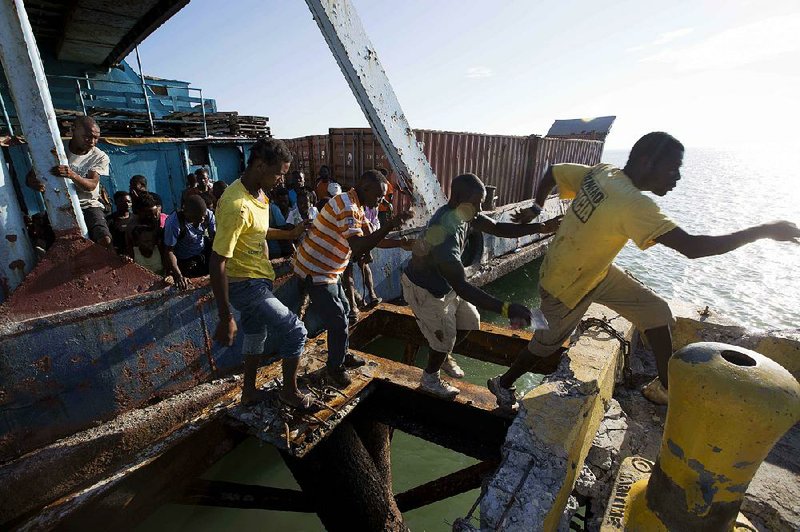ABOARD THE USS IWO JIMA -- A U.S. Navy warship is taking hundreds of Marines and sailors, along with power generators, water purifiers and bulldozers, to bolster relief efforts in Haiti, where Hurricane Matthew has left at least 750,000 people desperately in need of assistance.
RELATED ARTICLE
http://www.arkansas…">Matthew's damage put at $10B
Navy Capt. James Midkiff, commander of the USS Iwo Jima, said the eight helicopters on the ship will start ferrying food and medical supplies for aid organizations upon arrival, which had been expected as early as Wednesday. The Iwo Jima can also provide medical help in Haiti, where hundreds have died, the injured languish unattended in hospitals, doctors warn of a surge in cholera, and anger is rising in remote communities still awaiting aid a week after the hurricane struck.
The Iwo Jima is carrying more than 1,100 sailors and 600 Marines, and with them the number of U.S. military personnel in Haiti to provide relief will rise to about 2,500.
While the Marines and sailors have yet to be given their marching orders about what they will be doing, the plan is to "alleviate some of the suffering that is going on and prevent any additional loss of life," said Lt. Col. Christopher Hafer, the commanding officer of the Marines' Combat Logistics Battalion 24.
Matthew has left 473 people dead as of Tuesday, according to the official total from the National Civil Protection headquarters in Port-au-Prince. But area officials in one southwestern region, Grand-Anse, said the death toll there alone tops 500.
The U.N. humanitarian agency in Geneva has made an emergency appeal for nearly $120 million in aid, saying that about three-quarters of a million people in southwest Haiti alone will need "lifesaving assistance and protection" in the next three months.
Of high concern, the wreckage Matthew left behind has created the perfect conditions for spreading cholera, the waterborne bacterial disease that produces severe diarrhea and is contracted by drinking contaminated water or eating contaminated food.
Matthew sent rivers and outdoor latrines overflowing across the mountainous landscape. Cholera-contaminated water has leached into people's drinking wells that weren't ruined by Matthew's storm surge.
Many thousands of people whose homes were ruined are sharing close quarters with family and friends, the kind of proximity amid poor sanitation that aids in transmission. Already reports have been trickling in that the disease is spiking.
The World Health Organization says at least 200 suspected cholera cases have been reported across southwest Haiti since Matthew hit and it has pledged to send 1 million doses of cholera vaccine to Haiti.
"It is not looking good," said Dr. Unni Krishnan, director of Save the Children's emergency health unit in Haiti. "We should act very quickly to contain this, otherwise it could get out of control."
And cholera is not the only health emergency in the country. Krishnan and others warn about growing malnutrition because of widespread damage to crops and livestock, as well as fishing boats and gear, depriving many of their livelihoods in a country where more than half survive on less than $2 a day.
Doctors Without Borders opened a cholera treatment center in Port-a-Piment. As of Tuesday, medical staff had cared for 87 patients. Paul Brockmann, director of the organization's mission in Haiti, said the looming wet season may make it worse.
"The hurricane affected a population who was already in fragile health, and it has made their condition worse," he said. "There is a very long stretch of densely populated coastline which is at risk."
Cholera was unknown in Haiti until the fall of 2010. The disease was apparently introduced by U.N. peacekeepers from Nepal, part of a contingent of troops who had been rotating through the troubled country since 2004. They improperly disposed of waste from their base in the central plateau and it quickly spread through the network of rivers that people rely on to bathe, wash clothing and for drinking water. Since then, cholera has killed roughly 10,000 people and sickened more than 800,000 in Haiti.
Sandra Honore, the U.N. envoy for Haiti, said the health impact of Matthew cannot be overestimated and warned that the country is facing "a humanitarian tragedy and an acute emergency situation." She said the U.N. is providing water-purification systems and medicine to hard-to-reach areas, and she urged people everywhere to contribute to the $120 million U.N. appeal to help hurricane victims.
Information for this article was contributed by Ben Fox, David McFadden and Danica Coto of The Associated Press.
A Section on 10/13/2016
